December 2013
Vacancy at the CFRR: Freemasons Carrell-Espiner Postdoctoral Fellow
The Freemasons Carrell-Espiner Postdoctoral Fellowship offers the opportunity to work for two years within one of two internationally renowned research environments: the Centre for Free Radical Research or the Christchurch Heart Institute.
Areas of research in the Centre for Free Radical Research include free radical and antioxidants; inflammation; cancer; or nutrients and optimal health.
Applications close 26 January 2014.
UOC Research Seminar Series: Peroxiredoxins as markers of oxidative stress
PhD student Stephanie Moran presented Peroxiredoxins as markers of oxidative stress, at the UOC Research Seminar Series on Monday, 2 December 2013.
November 2013
NZ Listener Article: Our Chemical Romance

Professor Tony Kettle's research into chlorine bleach and cystic fibrosis in children has been profiled in the NZ Listener.
The article Our Chemical Romance: Bleach produced in the body can be both good and bad for our health, features in issue 3837, dated 23 November 2013.
Conference Speakers and Posters: Society for Free Radical Biology and Medicine Meeting
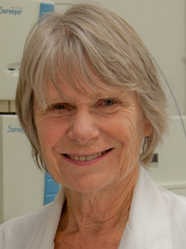
Professors Christine Winterbourn and Tony Kettle traveled to San Antonio, Texas, USA to present at the Society for Free Radical Biology and Medicine meeting.
Christine's talk, A case for radical mechanisms in redox regulation, was part of the pre-meeting workshop on Redox biology of thiols in signaling pathways, while Tony' spoke about Oxidation of Glutathione by Hypochlorous Acid in theAirways of Children with Cystic Fibrosis.
Five posters from the Centre of Free Radical Research were on display at the meeting:
- Uric Acid Oxidation as a Biomarker of Cardiovascular Disease - Dr Rufus Turner
- Potent Reversible Inhibition of Myeloperoxidase by Aromatic Hydroxamates - Dr Louisa Forbes
- Detection of Glutathione Conjugated to Oxidised Tyrosine Residues on Proteins - Andrew Das
- Covalent Modification of the Pro-Inflammatory Cytokine MIF by Dietary and Endogenous Electrophiles - Dr Nina Dickerhof
- Oxidation of Methionine in Calprotectin byNeutrophils in the Airways of Children with CysticFibrosis - Dr Nick Magon
C4 Cancer Research Workshop: Anticancer properties of Isothiocyanates
PhD student Emma Spencer presented at the third Canterbury Comprehensive Cancer Centre (C4) Cancer Research Workshop on 19 November in the Beaven Lecture Theatre.
Her talk was entitled Anticancer properties of Isothiocyanates.
October 2013
Marsden Grant for Tying Knots in Proteins with Chlorine Bleach: Novel post-translational modifications catalyzed by mammalian peroxidases
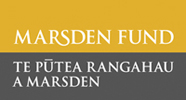 Scientists in the Centre for Free Radical Research have gained a Marsden grant to investigate how and when chlorine bleach ties knots in proteins.
Scientists in the Centre for Free Radical Research have gained a Marsden grant to investigate how and when chlorine bleach ties knots in proteins.
Chlorine bleach – the chemical we use around the home to kill germs and remove stains - is produced by white blood cells in our bodies to kill bacteria. However, it can also wreak havoc in inflammatory diseases by damaging essential proteins. New research suggests that an oxidizing agent like chlorine bleach is generated by an enzyme in cells that produce connective tissue. It is needed to strengthen collagen by linking its strands together to form a resilient protein mesh. Without this cross-linked mesh, individuals can develop cataracts and an autoimmune disease that destroys the kidneys and causes the lungs to hemorrhage. Chlorine bleach should be viewed as a natural chemical with a Jekyll and Hyde personality. It helps us to fight infections and form strong connective tissue but also endangers our health during uncontrolled inflammation.
This new grant will be directed by Professors Tony Kettle and Christine Winterbourn to understand how and when chlorine bleach ties proteins together. New methods will be developed to identify the cross-links in proteins from inflammatory sites in patients with heart disease, cancer, cystic fibrosis, and rheumatoid arthritis. These methods will also help identify the essential cross-links in collagen. The Christchurch scientists will team up with researchers from Vienna and Budapest to understand how peroxidasin produces chlorine bleach and whether it is used to weave proteins into strong molecular structures.
Knowledge from this grant will advance the understanding of how tissues are damaged during inflammation and show how the reactivity of chlorine bleach has been exploited by evolution to tie essential knots in the strands of collagen.
September 2013
UOC Research Seminar Series: Functional Consequences of Lowering Peroxiredoxin 3 Expression
BBiomedSc(Hons) student Kate Vick presented Functional Consequences of Lowering Peroxiredoxin 3 Expression, at the UOC Research Seminar Series on Monday, 23 September 2013.
Conference Speakers and Posters: 6th joint meeting of the Societies for Free Radical Research Australasia and Japan, Sydney
Five staff and students spoke at or produced posters for the 6th joint meeting of the Societies for Free Radical Research Australasia and Japan in Sydney on September 12-14, 2013.
Associate Professor Mark Hampton presented a talk on Peroxiredoxins as biomarkers of oxidative stress, while PhD student Rebecca Poynton spoke on Kinetics and biochemical properties of peroxiredoxin 3 hyperoxidation.
Posters were presented by Professor Tony Kettle (Uric acid as a biomarker of cardiovascular disease), Dr Nina Dickerhof (Covalent modification of the pro-inflammatory cytokine MIF by dietary and endogenous electrophiles) and Dr Nick Magon (Oxidised calprotectin as a biomarker for inflammatory disease).
Conference Speakers and Posters: 8th International Human Peroxidase Meeting, Sydney
Five members of the Centre for Free Radical Research spoke at or produced posters for the 8th International Human Peroxidase Meeting in Sydney on 9-12 September 2013.
Oxidation of uric acid during inflammation and cardiovascular disease was presented by Professor Tony Kettle. Professor Christine Winterbourn spoke about Monitoring hypochlorous acid production in the neutrophil phagosome, and Dr Lousia Forbe presented Potential reversible inhibition of myeloperoxidase by aromatic hydroxamates.
Dr Heather Parker presented two posters (Complex roles of reactive oxygen species in the formation and anti-microbial action of neutrophil extracellular traps and A novel method to measure neutrophil bactericidal activity), and Dr Nick Magon also presented a poster (Oxidised calprotectin as a biomarker for inflammatory disease).
Conference Speaker and Poster: Gravida Science Symposium, Auckland
 Associate Professor Mark Hampton presented a talk on New ways of thinking about and measuring oxidative stress at the Gravida Science Symposium held in Auckland on 9-10 September 2013.
Associate Professor Mark Hampton presented a talk on New ways of thinking about and measuring oxidative stress at the Gravida Science Symposium held in Auckland on 9-10 September 2013.
PhD student Rebecca Poynton presented a poster at the Symposium, Characterising the susceptibility of peroxyredoxin 3 to hyperoxidation, and also gave a 90 second 'bus stop' presentation relating to this poster.
August 2013
Oxygen lights up Queenstown Research Week
The recent research week in Queenstown was ignited by the University of Otago Oxygen Theme meeting that doubled as QMB Redox.
Over 70 delegates came to hear multidisciplinary talks by outstanding invited speakers from the USA, UK, Australia and our local experts. Chief organizer Assoc. Prof Mark Hampton said he was delighted with breadth of research presented - demonstrating just how important the biology of oxygen is to Alzheimer's disease, cataract formation, heart attacks, cancer, diabetes, and immune defense.
The joint sessions with QMB Heart and QMB Enzymes, organized by Assoc Prof Sally McCormick and Dr Wayne Patrick from Biochemistry at the University of Otago in Dunedin, were a huge success. They show cased the many and varied ways oxygen unites with enzymes and is central to the pathology of cardiovascular disease.
The student poster session was a highlight. There was a buzz of excitement throughout the session with students keen as mustard to share their latest research with their peers and the world experts. Two Oxygen Theme students won poster awards.
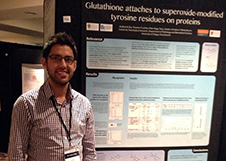 The top prize went to Andrew Das (pictured) who could not believe how in one night he could talk deeply about his poster with world renowned scientists, hear a fantastic talk on memory by a Nobel Laureate, and finish in the small hours dancing Gangnam with a crowd of postgrads.
The top prize went to Andrew Das (pictured) who could not believe how in one night he could talk deeply about his poster with world renowned scientists, hear a fantastic talk on memory by a Nobel Laureate, and finish in the small hours dancing Gangnam with a crowd of postgrads.
Prof Tony Kettle, director of the Oxygen Theme and the Centre for Free Radical Research, is already planning the next venture to Queenstown in 2015.
Kiwifruit daily can improve mood and energy
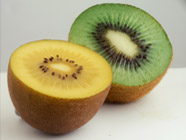 Eating two kiwifruit a day can improve a person's mood and give them extra energy, new research from the Centre for Free Radical Research shows.
Eating two kiwifruit a day can improve a person's mood and give them extra energy, new research from the Centre for Free Radical Research shows.
Over a six-week period, normally-healthy young men either ate two kiwifruit a day or half a kiwifruit daily as part of a research study into the potential mood-enhancing effects of the fruit.
Professor Margreet Vissers and her team found those eating two kiwifruit daily experienced significantly less fatigue and depression than the other group. They also felt they had more energy. These changes appeared to be related to the optimising of vitamin C intake with the two kiwifruit dose. Kiwifruit are an exceptional source of vitamin C.
The findings were published recently in the Journal of Nutritional Science and articles were featured in the New Zealand Herald (Kiwifruit can improve mood and energy – study), on www. News.MensHealth.com (The fruit that fights the blues), and Dr Anitra Carr was quoted on Radio Rhema and Newstalk ZB.
The study was carried out with 54 young male university students who generally eat little fresh fruit and whose vitamin C levels are lower than desirable due to this.
Professor Vissers says “the two kiwifruit per day ensured that the study group's vitamin C levels were optimal, and this was needed to see an effect on mood and energy. The amount of vitamin C required for this is higher than the current recommended intake. Our study provides good evidence to support the view that there are measureable health benefits to be obtained from eating a good amount of fruit and vegetables daily. For best benefit, it is important to include high vitamin C foods in your daily diet.”
Vitamin C helps activate a number of enzymes in the body that enhance the levels of metabolic energy and different neurochemicals in the brain, Professor Vissers says. This means taking in more vitamin C could decrease feelings of fatigue and increase physical and mental energy.
The findings were published recently in the Journal of Nutritional Science, leading to articles in the New Zealand Herald (Kiwifruit can improve mood and energy – study), on www. News.MensHealth.com (The fruit that fights the blues), and Dr Anitra Carr was quoted on Radio Rhema and Newstalk ZB.
Conference Speakers: REDOX Satellite Meeting of QMB, Queenstown
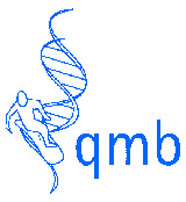 Five staff members presented at the REDOX satellite meeting of QMB in Queenstown on 25-26 August 2013.
Five staff members presented at the REDOX satellite meeting of QMB in Queenstown on 25-26 August 2013.
On 25 August Dr Heather Parker presented Neutrophil extracellular traps: friends or foe, and Professor Tony Kettle spoke about the Oxidation of uric acid in cardiovascular disease.
The following day Professor Christine Winterbourn presented Detecting and quantifying oxidative stress in biological systems. Dr Louisa Forbes discussed Potent reversible inhibition of myeloperoxidase by aromatic hydroxamates, and Professor Margreet Vissers spoke about Tumour biology, metabolic stress and vitamin C.
Conference Posters: REDOX Satellite Meeting of QMB, Queenstown
A total of 15 Posters were presented at the REDOX satellite meeting of QMB in Queenstown on 25-26 August 2013.
Eight of the Centre's Postgraduate Students produced posters for the Conference:
- Neutrophil-mediated oxidation of erythrocyte peroxiredoxin 2 as a potential marker of oxidative stress in inflammation – Simone Bayer
- Detection of glutathione conjugated to oxidized tyrosine residues on protein – Andrew Das
- Oxidised calprotectin as a biomarker for inflammatory disease – Nick Magon
- Kinetics and biochemical properties of peroxiredoxin 3 hyperoxidation – Rebecca Poynton
- Effect of hypoxia on neutrophil survival and function - Usha Pujary
- The diterpenoid adenanthin favors binding to glutathione over peroxiredoxin 2 in erythrocytes – Marjolein Soethoudt
- Assessing inhibition of macrophage migration inhibitory factor by novel isothiocyanates – Emma Spencer
- Functional consequences of lowering mitochondrial peroxiredoxin 3 expression – Kate Vick
There were also seven posters were presented by staff from the Centre of Free Radical Research:
- Pharmacologic vitamin C improves fatigue and quality of life in cancer patients – two case reports – Dr Anitra Carr
- Covalent modification of the pro-inflammatory cytokine MIF by dietary and endogenous electrophiles – Dr Nina Dickerhof
- Pro-myeloperoxidase is present in circulation and a potential participant in cardiovascular disease – Dr Irada Khalilova
- Increased tumour ascorbate is associated with extended disease-free survival and decreased hypoxia-inducible factor-1 activation in patients with colorectal cancer – Dr Caroline Kuiper
- Using the Seahorse Bioscience Extracellular Flux Analyzer to measure the consequences of oxidative stress on mitochondrial function – Dr Karina O'Connor
- Hyperoxidized peroxiredoxin 2 interacts with the protein disulphide isomerase ERp46 – Dr Paul Pace
- Uric acid oxidation as a biomarker of cardiovascular disease – Dr Rufus Turner
July 2013
PhD Student wins UOC 3 Minute Thesis Competition Heat
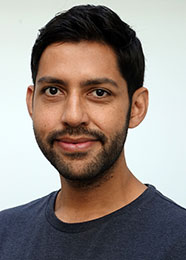 PhD Student Andrew Das has won the 2013 UOC Heat of the 3 Minute Thesis Competition with his talk, A Radical View.
PhD Student Andrew Das has won the 2013 UOC Heat of the 3 Minute Thesis Competition with his talk, A Radical View.
Andrew goes through to the next round in Dunedin on 30 August to compete for a spot in the Australasian Finals at the University of Western Sydney in October.
Andrew is undertaking his PhD under the supervision of Professor Tony Kettle and Professor Christine Winterbourn.
Biomedical Journal Podcast: Professor Christine Winterbourn
The Biomedical Journal has released a podcast of Prof Christine Winterbourn discussing an article the Centre for Free Radical Research have recently had published in the journal.
The article, Hyperoxidized peroxiredoxin 2 interacts with the protein disulfide- isomerase ERp46 is in Volume 453, Number 3.
UOC Research Seminar Series: The effect of hypoxia on neutrophil lifespan and function
PhD Student Usha Pujary presented The effect of hypoxia on neutrophil lifespan and function, at the UOC Research Seminar on Monday, 8 July 2013 in the Beaven Lecture Theatre.
Otago Post Article: No need to leave home to study at Otago
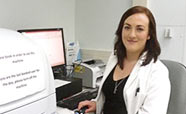 PhD Student Emma Spencer features in issue 14 of the Otago Post - the University's postgraduate newsletter.
PhD Student Emma Spencer features in issue 14 of the Otago Post - the University's postgraduate newsletter.
In the article, Emma shares why she chose to study at the University of Otago, Christchurch and discusses her PhD, which is an extension of the work she did as a BBiomedSc(Hons) student.
June 2013
Conference Speaker: Sixth Pacific Symposium on Radical Chemistry
Professor Christine Winterbourn was an invited Sixth Pacific Symposium on Radical Chemistry in Vancouver held 16-20 June.
Christine's talk was entitled Radical-radical addition of superoxide in biology – a mechanism for hydroperoxide formation and Cys-Tyr crosslinking.
Conference Posters: Oxygen Club of California Nutrition, Oxygen Biology and Medicine Conference
Professor Margreet Vissers presented two posters at the Oxygen Club of California Nutrition, Oxygen Biology and Medicine Conference in Paris from 5-7 June.
The two posters were Human skeletal muscle ascorbate is highly responsive to changes in vitamin C intake and plasma concentrations, and Mood improvement in young adult males following supplementation with gold kiwifruit, a high vitamin C food.
Canterbury University Seminar: Fun with doughnuts 2 - Exploring the Biology of Peroxiredoxins
Associate Professor Mark Hampton was invited to speak at Canterbury University's School of Biological Sciences Seminar Series at on 6 June. His talk was titled Fun with doughnuts 2 - Exploring the Biology of Peroxiredoxins.
May 2013
Conference Speaker: ASPR-PSM Joint Meeting
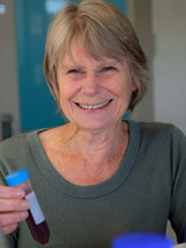 Professor Christine Winterbourn was invited to give a series of talks at the Asian Society for Paediatric Research (ASPR) and Perinatal Society of Malaysia (PSM) 2013 Joint Meeting in Malaysia.
Professor Christine Winterbourn was invited to give a series of talks at the Asian Society for Paediatric Research (ASPR) and Perinatal Society of Malaysia (PSM) 2013 Joint Meeting in Malaysia.
Christine's first half hour presentation was on Free radical biology in medicine and biomarkers in oxidative injuries.
She also gave an hour long plenary session on Inflammation in childhood diseases – from bench to bedside.
Oxidative stress in prematurity – a biochemical perspective was Christine's third and final presentation.
Conference Speaker and Posters: Diet and Optimum Health Conference
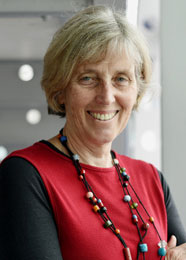 Two members of the Free Radical team recently attended the Diet and Optimum Health Conference at Oregon State University, USA to speak and present posters.
Two members of the Free Radical team recently attended the Diet and Optimum Health Conference at Oregon State University, USA to speak and present posters.
Professor Margreet Vissers presented a talk on Tumour levels of vitamin C are associated with hypoxia-inducible factor-1 and disease-free survival in colorectal cancer.
Two posters were also presented at the conference by Dr Anitra Carr, Human skeletal muscle ascorbate is highly responsive to changes in vitamin C intake and plasma concentrations and Mood improvement in young adult males following supplementation with gold kiwifruit, a high vitamin C food.
Statesman Journal Article: Food as medicine- four nutrients to boost in your diet for optimal health
Our work on “Vitamin C and Gold Kiwis” featured in an article on Statesmanjournal.com Food as medicine: four nutrients to boost in your diet for optimal health on May 21, 2013.
April 2013
UOC Research Seminar Series: Oxidised calprotectin as a biomarker for inflammation
PhD Student Nick Magon presented Oxidised calprotectin as a biomarker for inflammation, at the UOC Research Seminar Series on Monday, 22 April 2013 in the Beaven Lecture Theatre.
Radio NZ – Our Changing World: Endogenous Antioxidants
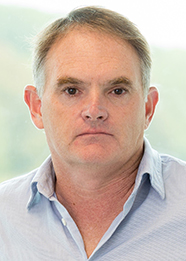 Associate Professor Mark Hampton was interviewed for Radio NZ's Our Changing World Series.
Associate Professor Mark Hampton was interviewed for Radio NZ's Our Changing World Series.
In the feature, Endogenous Antioxidants Mark discusses how he is trying to determine how the body's own antioxidants work and how they could be used to treat cancer.
Conference Speaker: New Zealand Association of Scientists
Professor Christine Winterbourn presented a talk, Fundamental and translational research in bioscience – getting the balance right at the New Zealand Association of Scientists Conference in Wellington on the 3 April 2013.
March 2013
UOC Health Lecture Series: Tony Kettle gives Inaugural Professorial Lecture
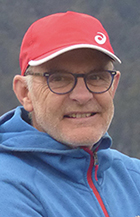 Professor Tony Kettle gave his Inaugural Professorial Lecture, Free radicals spark the fires of inflammation to a packed audience in the Rolleston Lecture Theatre as part of the UOC Health Lecture Series on 13 March.
Professor Tony Kettle gave his Inaugural Professorial Lecture, Free radicals spark the fires of inflammation to a packed audience in the Rolleston Lecture Theatre as part of the UOC Health Lecture Series on 13 March.
Watch Tony Kettle's Inaugural Professorial Lecture
Listen to Tony Kettle's Inaugural Professorial Lecture
Consumer Article & TVNZ Sunday Interview
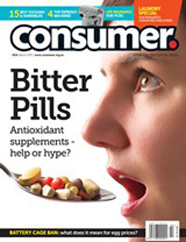 Professor Margreet Vissers was interviewed recently as an expert by Consumer magazine.
Professor Margreet Vissers was interviewed recently as an expert by Consumer magazine.
The article Bitter pills - antioxidant supplements, features in the March edition on pages 8-10.
Margreet was also interviewed for the TVNZ Sunday programme which aired on 25 March at 7.00pm
UOC Research Seminar Series: Exploring the anti-cancer and anti-inflammatory properties of novel isothiocyanates
PhD student Emma Spencer presented Exploring the anti-cancer and anti-inflammatory properties of novel isothiocyanates at the UOC Research Seminar Series on 4 March.
February 2013
UOC Fortieth Anniversary Celebrations: Biomedical Presentations
Two of our CFRR Principal Investigators, Professor Christine Winterbourn and Associate Professor Mark Hampton presented at the University of Otago, Christchurch Fortieth Anniversary Biomedical Presentations.
Professor Christine Winterbourn's talk presented Characterising the role of free radicals in disease and Associate Professor Mark Hampton's talk was entitled Exploring nature's medicine chest.
On the same day, Mark was also featured in The Press article, Natural hunt for cell killers. (21 Feb 2013, Good Living section, page 5).
UOC Research Seminar Series: The role of vitamin C in regulating HIF-1 in cancer cells
PhD student, Caroline Kuiper recently presented a talk, The role of vitamin C in regulating HIF-1 in cancer cells at the lunchtime UOC Research Seminar Series on 25 February.
January 2013
CFRR first in New Zealand to get the Seahorse XF 24 Analyzer
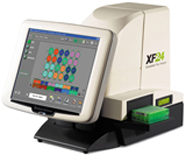 The CFRR has purchased New Zealand's first Seahorse XF 24 Analyzer.
The CFRR has purchased New Zealand's first Seahorse XF 24 Analyzer.
The “Seahorse” provides very sensitive measures of the rate that cells consume oxygen and acidify their surroundings. A change in oxygen consumption following the injection of specific metabolic inhibitors allows measurement of the two main energy producing pathways - mitochondrial respiration and glycolysis.
The first uses of this new equipment will be monitoring of mitochondrial dysfunction following the exposure of cells to oxidative stress, and measuring the effects of drugs that attempt to kill cancer cells through disruption of mitochondrial antioxidant pathways.
Previous methodology required the use of large numbers of mitochondria isolated from animal tissues, but the sensitivity of the Seahorse and its non-invasive nature enables analysis of mitochondrial function within living cells grown on a microplate.
Visiting Professor on Sabbatical at the CFRR
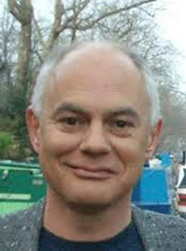 Prof Guy Salvesen from the Sanford-Burnham Institute has arrived to begin at 6 month sabbatical at the Centre for Free Radical Research.
Prof Guy Salvesen from the Sanford-Burnham Institute has arrived to begin at 6 month sabbatical at the Centre for Free Radical Research.
Prof Salvesen is a biochemist and is the Director of the Program Director in Apoptosis and Cell Death Research at the Sanford-Burnham Institute.
Travel Grant: Diet and Optimum Health Conference 2013
 Dr Anitra Carr has been awarded a travel grant to attend the Diet and Optimum Health Conference, Corvallis, Oregon, USA, in May 2013
Dr Anitra Carr has been awarded a travel grant to attend the Diet and Optimum Health Conference, Corvallis, Oregon, USA, in May 2013
